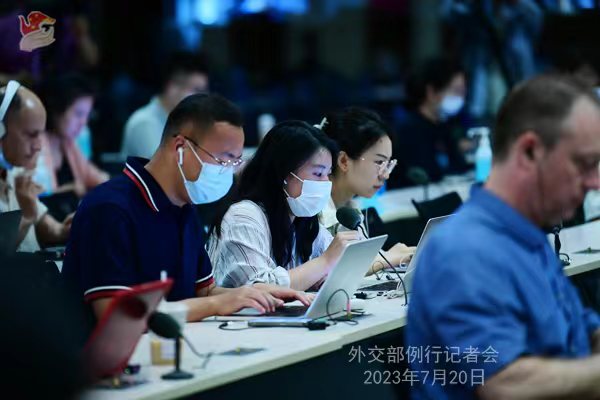| Foreign Ministry Spokesperson Mao Ning’s Regular Press Conference on July 20, 2023 |
| 2023-07-20 18:57 |
|
CCTV: On a briefing held on July 19, US Special Presidential Envoy for Climate John Kerry said he had had cordial and productive meetings with the Chinese side. The US and China will work together intensively in the next weeks in preparation for important negotiations during COP28. What’s your comment on that? Mao Ning: Climate change is a global challenge that requires a global response. China is a doer on ecological conservation and climate governance. China accounts for a quarter of the world’s newly added green areas since 2000. We are the first country to have achieved zero net land degradation, reduced both the areas of desertified and sandified land, and expanded our forest coverage ratio and forest stock volume. China has the biggest clean power generation system in the world. Our installed hydro, wind, and solar capacities all top the world. With an average three-percent year-on-year energy consumption growth, China has propelled an economy growing at an average annual rate of 6.2 percent. We are one of the fastest countries in terms of lowering energy intensity. China is also a trailblazer on environmental governance. We have actively facilitated the full, balanced, and effective implementation of the UN Framework Convention on Climate Change and the Paris Agreement, while providing as much support and help we can to other developing countries—a contribution we have made to a fair and equitable system of global climate governance that benefits all. At this week’s National Conference on Ecological and Environmental Protection, President Xi Jinping gave an important speech, one that will guide our efforts to further step up environmental protection and ecological progress. China will stay committed to ecological conservation and work with all other countries for a clean and beautiful world. NHK: A question on Japan’s discharge of the treated, diluted water from Fukushima nuclear plant. Due to this issue, China has tightened restrictions on food imports from Japan. The Japanese government said that the safety of Japanese food has been scientifically proven, and that it would ask China to lift import restrictions as soon as possible. What’s the foreign ministry’s response? Mao Ning: The Chinese government puts people first. Our job is to be responsible for the health of our people and the marine environment. Our opposition to Japan’s ocean discharge plan is based on facts and reason, so are the measures that we have decided to take. We urge Japan to heed the call of the international community, stop pushing through the discharge plan, engage in full, sincere consultations with its neighbors, dispose of the nuclear-contaminated water in a responsible way and accept rigorous international oversight. Beijing Daily: Lately, the Japanese government has sought to justify its discharge plan at the NATO Summit, the ASEAN-plus ministerials, the Eastern Caribbean Ministerial Meeting on Fisheries and Sustainable Use of Living Marine Resources and so on, while signaling that the discharge scheduled to begin this summer will not be postponed. However, the National Fisheries Cooperative Federation of Japan and fisheries cooperatives of Fukushima and Miyagi have all reiterated their opposition to the plan. What’s your comment? Mao Ning: The Japanese government has done several things recently on the issue of ocean discharge—it has launched a global PR campaign, set up a special fund to silence the public in opposition to the plan and used the IAEA’s review report as a “greenlight” for its plan—to act as if the ocean discharge plan is a done deal. If the Fukushima nuclear-contaminated water is truly safe, Japan wouldn’t have to dump it into the sea—and certainly shouldn’t if it’s not. The world has widely questioned the legitimacy, legality and safety of Japan’s discharge plan. No matter how Japan tries, there is no way to whitewash its discharge plan. The protests from neighboring countries and the questions raised by people within Japan are all clear evidence. A Japanese media outlet reported on July 16 that over 80 percent of Japanese respondents to a recent poll consider the government’s explanation over the Fukushima wastewater to be insufficient. Japan’s scholars and environmentalists have also spoken up, saying that the discharge should not be tolerated, given the radioactive pollution it will add to the radioactive leak caused by the 2011 Fukushima accident. The Japanese government’s decision does not take into account at all the public concerns, particularly those of the fishing and farming communities. Most likely, the government will not keep its promise of not starting the ocean discharge before gaining the understanding of relevant parties. I need to stress that there is no precedent nor commonly accepted standard for dumping nuclear-contaminated water into the ocean. It is a matter of science and a question about attitude as well. We urge Japan to take seriously the legitimate concerns of the international community and the people in Japan, stop pushing through the ocean discharge plan, have full, sincere communication with neighboring countries, dispose of the nuclear-contaminated water in a truly responsible way, and accept strict international oversight. RIA Novosti: Russia, following its decision not to extend its participation in the Black Sea grain deal, announced yesterday that from July 20, all ships heading to Ukrainian ports in the Black Sea will be considered as potential carriers of military cargo. What’s China’s comment on this? Mao Ning: We hope that parties concerned will properly resolve international food security issues through dialogue and consultation. China’s position on the Ukraine crisis is consistent and clear-cut. We will continue to play a constructive role in facilitating the political settlement of the crisis.
|
 | ||||||||||||
 | ||||||||||||
|

